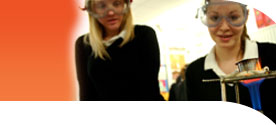



The science programme of study provides a context for developing pupils' personal, learning and thinking skills (PLTS).
The requirement in the key processes to carry out practical, investigative and fieldwork activities, both individually and in groups, requires pupils to process and evaluate information, planning what to do and how to go about it. Pupils make informed and reasoned decisions. The programme of study specifies that pupils are given the opportunity to pursue an independent enquiry into a scientific topic of personal interest.
Scientific ideas are developed by approaches that use a combination of experimentation, evidence and creativity. This encourages pupils to think creatively by generating and exploring ideas and making original connections. Pupils try different ways of tackling a problem and work with others to find imaginative solutions.
The requirement in the key processes to carry out practical, investigative and fieldwork activities, both individually and in groups, requires pupils to work confidently with others, adapting to different contexts and taking responsibility for their own contribution. Pupils listen to and take account of different views. They form trusting relationships, resolving issues to reach agreed outcomes.
Work in science gives pupils the chance to organise themselves and show personal responsibility, initiative, creativity and enterprise with a commitment to learning and self-improvement. They are encouraged to actively embrace change, respond positively to new priorities, cope with challenges and look for new opportunities.
The requirement in the key processes to use appropriate methods, including ICT sources, to communicate scientific information and contribute to presentations and discussions about scientific issues requires pupils to actively engage with issues that affect them and those around them. This then encourages them to play a full part in the life of their school and wider community by taking responsible action to bring improvements to others as well as to themselves.
The study of science also provides opportunities for pupils to become reflective learners by helping them develop their evaluation skills. Pupils can then apply this to evaluation of their own strengths and weaknesses, setting themselves realistic goals with criteria for success. They monitor their own performance and progress, inviting feedback from others and making changes to further their learning. The use of peer review is a fundamental aspect of how science works.
With thoughtful planning, a range of PLTS can be embedded into any sequence of work. For example, pupils might be asked to carry out an investigation to find out how much of an apple is water (from key stage 3 scheme of work, unit 9m). Pupils might: